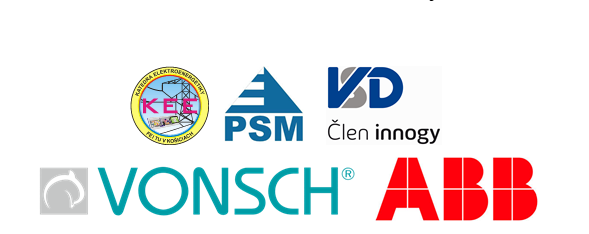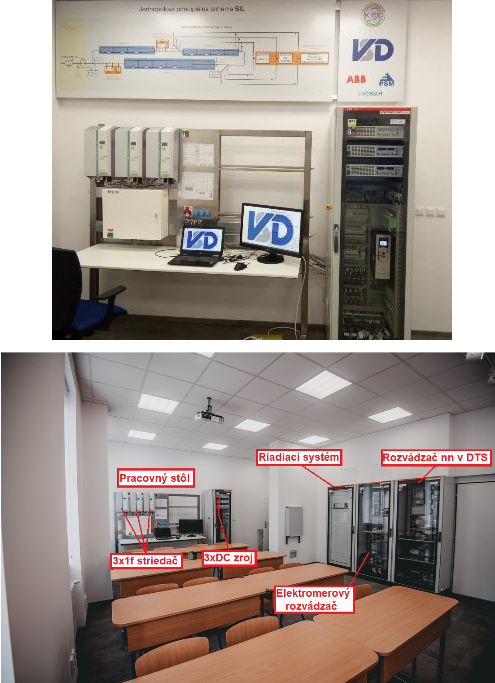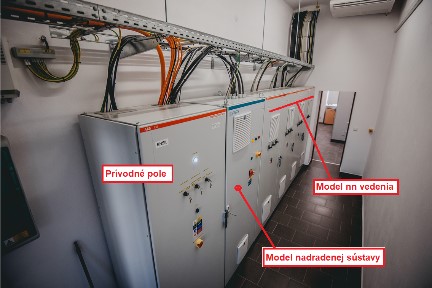
Head of laboratory: doc. Ing. Dušan Medveď, PhD.
Laboratory description:
Introduction
The company Východoslovenská distribučná, a.s. put into operation at the TUKE premises at the Department of Electric Power Engineering the Smart Industry Lab, which models the low voltage distribution system..
TUKE has a new energy intelligent laboratory – Smart Industry Lab, which models the low voltage distribution system. It was put into operation by the company Východoslovenská distribučná (VSD) in cooperation with the Technical University in Košice. The laboratory, which is located on the premises of the Department of Electrical Power Engineering, is a continuation of the already existing HybridLab laboratory. It simulates conditions in a smart home and is used to test hybrid photovoltaic systems. The mutual technological connections of these laboratories enable the analysis of the effects of new household technologies on the distribution system.
Subjects and outputs of education:
- Bachelor study: Subject Measurement in power engineering (basic knowledge of measurement theory and metrology, determination of measurement uncertainties, practical skills in the implementation of measurements in power engineering and processing of measurement documentation)
- Bachelor study: Subject Non-traditional energy sources (Basic knowledge in the field of the impact of photovoltaic systems on the distribution system, data processing in the SCADA environment and their evaluation),
- Engineering study: Subject Modeling in power engineering (basic knowledge in the field of modeling of power system elements)
- Bachelor study: Subject Faults in the power system (basic knowledge of the methods of operation of electrical networks, short-circuit calculations and their analysis in the EC)
- Bachelor study: Subject Transformations of electrical energy (basic knowledge from the conversion of electrical energy into final useful forms (mechanical, light, chemical and thermal))
- Engineering study: Subject Power system operation management (basic knowledge about new directions of power system management in a liberalized electricity market)
- Bachelor study: Subject Lighting technology (basic knowledge for creating the right lighting environment for various work and leisure activities of people)
- Engineering study: Subject Overvoltages in electrical networks (basic knowledge about the occurrence of overvoltages in electrical networks for different operating conditions)
- Doctoral study: Subject Theoretical Power Engineering: acquisition of in-depth theoretical knowledge, using the latest research findings and trends in the development of power engineering. – modeling of elements in the electrical system. Acquisition of new methods of analysis of electrical systems. Ability to solve wave processes on lines, wave processes on lines, model and analyze electromagnetic fields, solve surface phenomena in the transmission of electricity, investigate electromagnetic transients.
- Doctoral study: Subject Scientific activity 1-5 .: Ability to independently design, construct, implement and modify a substantial part of research with scientific integrity and contribute to the original research to expand the boundaries of scientific knowledge through the implementation of an extensive set of works, some of which are worthy of peer-reviewed publications. Achieving original scientific results, acceptable at the international level. Based on the implementation of scientific research, the graduate is considered an expert in his field.
- Doctoral study: Subject Analysis of the power system: Extension of theoretical knowledge acquired in the second stage of the study with the latest research results and development trends in the field of management and operation of the power system using elements of artificial intelligence. Ability to apply information and control systems in solving the stability of the power system and one-way transmission of electricity. Gaining expanding knowledge about the degradation processes of power system equipment on the specifics of TVN in one-way ZVN lines. Ability to solve technical problems of operation of electricity systems within UCTE and problems of rationalization of electricity consumption. Knowledge of the principle and ability to work in the conditions of a liberalized electricity market.
- Doctoral study: Subject Dissertation project: Acquisition of methods of scientific work. Deepening knowledge of the topic of the dissertation. Intensive research to achieve original scientific results, acceptable at international level. The doctoral student is able to demonstrate the ability of creative independent and team work in solving a scientific research task or project by presenting results in the form of scientific publications, journals and conferences, participation in research teams of grant tasks, etc. He is able to formulate the goals of the dissertation and methods that lead to the fulfillment of its goals. He is able to design and apply scientific procedures for solutions. Can present procedures and results of his / her scientific work.
Virtual tour of the laboratory
What is the laboratory for?
Smart Industry Lab is used for educational, experimental and research purposes and for the needs of VSD. The laboratory models a low voltage system to which the largest number of VSD customers is connected. It is used to test the feedback effects of devices that are connected to the distribution system either by the operator or its customers, both customers and manufacturers, or a combination of them, with Smart Industry Lab allowing to examine their impact on the system and at the same time purpose to use different gauges and analyzers.
Laboratory options
Above all, the laboratory makes it possible to model low-voltage power lines of various lengths, from 60 meters to 3,500 meters. It is then possible to connect various devices to this line at predetermined points. These devices can either positively or negatively affect the simulated line, ie the distribution system model. Such devices are, for example, various types of electricity generation sources, appliances and accumulators of electricity, control electronics and others. According to him, the laboratory has a high level of automation – it is equipped with a control system that allows to change, for example, input values of voltage, frequency, parameters of the modeled distribution system, parameters of sources, electricity consumers and also the place of their connection to the system.
he laboratory is equipped with special software that can be used to specify the impact of customers on the distribution system. For example, the extent to which these appliances affect the quality of electricity. The Smart Industry Lab also includes a real electric car charger located in the KEE car park outdoors, to get acquainted with the topic of e-mobility.
Two in one
Another possibility is the interconnection of Smart Industry Lab and HybridLab laboratory, as both laboratories are operated on the premises of the Technical University in Košice. By connecting the laboratories, we get a more faithful imitation of the real situation in the system. Seemingly the same customers may have different effects on the distribution system, given the different points of connection to it. The interoperability of laboratories expands the possibilities of testing resources.
Measuring the impact of electromobility
Since the launch of the Smart Industry Lab, VSD has carried out several measurements at the electric vehicle charging station, which is an integral part of the laboratory. After the analysis of the measurement results, it is clear that by charging the electric cars, especially of the lower middle class, the load of the distribution system is quite asymmetrical. This may in some places in the distribution system lead to exceeding the permitted values of the quality of electricity supplied to customers in the future. The negative effect of an unbalanced load on the distribution system is much more intense than the effect of a symmetrical load. Simply put, if the charging of electric cars were exclusively symmetrical, it would be possible to connect five times more charging stations of the same power to the system.
Laboratory page:
http://people.tuke.sk/dusan.medved/SIL/



